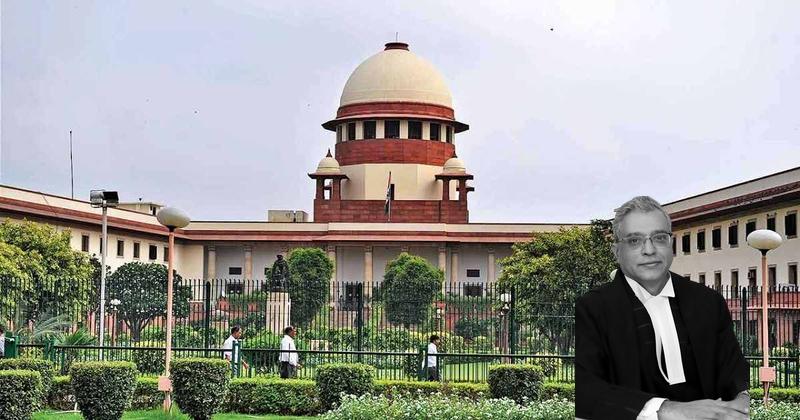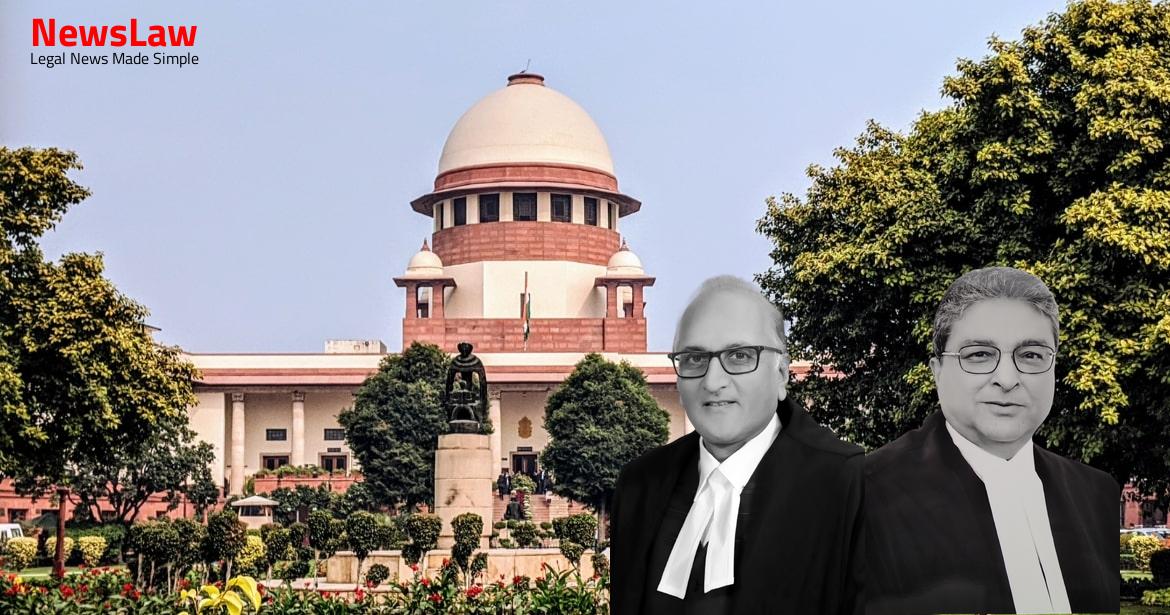In a recent case of aggravated sexual assault, the court’s legal analysis played a crucial role in determining the fate of the accused. The interpretation of the POCSO Act and the application of relevant legal provisions were central to the decision-making process. Let’s delve deeper into how the court analyzed the evidence and upheld the principles of justice in this sensitive matter.
Facts
- Accused appealed before High Court challenging conviction under POCSO Act.
- High Court confirmed the conviction and sentence of life imprisonment.
- Accused is now appealing the High Court judgment.
- Trial Court ordered accused to pay a fine of Rs.50,000, with Rs.30,000 to be given to the victim as compensation.
- Accused found guilty based on victim’s deposition with Dr. Vandana Sundriyal.
- Sentenced to life imprisonment and fined Rs.50,000.
- High Court dismissal of appeal led to the current appeal by the accused.
- Accused denied the charges and opted for trial.
- Accused was caught red-handed by people gathered around and handed over to the police.
- Chargesheet was filed against the accused for offenses under Section 376(2)(F) of IPC and Section 3/4 of the POCSO Act.
- The accused and the victim girl were disrobed during the incident.
- Victim girl, aged four, was alone in the house when the incident occurred.
- Accused enticed and took the victim girl into the bushes to rape her.
- The victim girl’s statement and witness statements were recorded during the investigation.
- Medical examination of the victim girl was conducted by Dr. Vandana Sundriyal.
- Thirteen witnesses, including the victim girl’s mother and Dr. Vandana Sundriyal, were examined by the prosecution.
- Accused was charged with offenses under Section 376(2)(i) of IPC and Section 5/6 of the POCSO Act.
Also Read: Ruling on Circumstantial Evidence in Murder Case
Arguments
- Imposing life sentence is deemed too harsh and disproportionate for the offence committed.
- The prosecution has proved the case beyond doubt, according to Shri Krishnam Mishara, representing the State of Uttarakhand.
- The case does not qualify as aggravated penetrative sexual assault under Section 6 of the POCSO Act.
- Dr. Vandana Sundriyal, an independent witness, supports the prosecution’s case.
- Request made for a lesser punishment than life imprisonment due to the absence of penetration and aggravated penetrative sexual assault.
- The appeal contends that the High Court erred in confirming the conviction under Section 5/6 of the POCSO Act.
- The accused’s counsel argues that the witnesses did not support the prosecution’s case.
- It is contended that the accused could not be convicted solely based on the testimony of PW-10, Dr. Vandana Sundriyal.
- The alleged recording of the incident in a mobile device was not sufficiently established by the prosecution.
- Considering the prosecution’s case, the offence would at most fall under sexual assault punishable under Section 8 of the POCSO Act.
- The minimum sentence under Section 6 of the POCSO Act at the time of the incident was ten years, potentially extending to life imprisonment.
- The accused’s counsel highlights the advanced age of the accused, approximately 65 years at the time of the incident and 75 years presently.
- Accused misused his position as a neighbour and attempted to rape a minor girl
- Caught red-handed before succeeding in the rape attempt
- Victim girl narrated the incident to Dr. Vandana Sundriyal – PW-10
- No leniency should be shown to the accused due to the severity of the offense and the age of the victim
- Accused does not deserve any sympathy or leniency
Also Read: Challenging Legal Presumptions in Negotiable Instrument Cases
Analysis
- The accused is aged between 70-75 years and suffering from Tuberculosis (TB)
- POCSO Act is gender-neutral legislation designed to protect children from sexual offences
- Evidence from Dr. Vandana Sundriyal, an independent witness, supports the prosecution’s case
- The accused committed aggravated penetrative sexual assault on a 4-year-old girl, showing a disturbing mindset
- The victim girl suffered physical pain and irritation due to the assault
- The accused exploited the absence of the victim’s parents and took advantage of the situation
- Stringent punishment under the POCSO Act is necessary for crimes against children
- Special provisions for children are mandated by Article 15 of the Constitution
- The accused’s actions depict a grave violation of the victim’s rights and innocence
- Section 3 of the POCSO Act defines ‘penetrative sexual assault’.
- Section 4 provides ‘punishment for penetrative sexual assault’.
- Section 5 of the Act defines ‘aggravated penetrative sexual assault’ and provides punishment for the same.
- In the present case, the accused penetrated his finger in the vagina of a four-year-old girl, resulting in pain, irritation, redness, and swelling around the vagina.
- The Trial Court and the High Court correctly convicted the accused under Sections 5 and 6 of the POCSO Act for aggravated penetrative sexual assault.
- The request for leniency based on the accused’s old age needs to be considered in light of the objectives of the POCSO Act and international conventions to protect children from sexual abuse and violence.
- The Pocso Act aims to protect children from sexual assault, harassment, and exploitation.
- Emphasis is placed on the best interest and well-being of the child at all stages of development.
- Special courts are established to address offences related to sexual abuse of children.
- Privacy and confidentiality of a child are prioritized throughout the judicial process.
- Strict punishments are mandated for perpetrators of sexual assault and harassment against children.
- Exploitation of children is considered a crime against humanity.
- Children, especially girls, require full protection and care in both urban and rural areas.
- Courts have a significant responsibility to provide legal protection to children in need.
- The dignity of the child is a crucial aspect of the legislation.
- Minor victims of sexual abuse require heightened protection due to their vulnerability.
- Mental and physical stability of the child is emphasized in cases of sexual assault.
- The accused does not deserve sympathy or leniency due to the betrayal of trust and impairment of social values.
- The punishment provided for aggravated penetrative sexual assault under Section 6 prior to its amendment was considered.
- Considering mitigating circumstances, it is recommended to convert the life sentence to fifteen years rigorous imprisonment and maintain the imposed fine.
- The proposed punishment is deemed adequate and commensurate with the offence committed.
Also Read: Legal Analysis Critique in High Court’s Quashing Order
Decision
- The accused is rightly held guilty for the offences under Sections 376(2)(i) of IPC and Section 5 of the POCSO Act.
- The sentence of life imprisonment is converted to fifteen (15) years RI with fine/compensation as imposed by the Trial Court and confirmed by the High Court.
- The minimum punishment as per the amended Section 6 is twenty years, extendable to life imprisonment.
- The accused will undergo fifteen (15) years RI with fine for the aforementioned offences instead of life imprisonment.
Case Title: NAWABBUDIN Vs. STATE OF UTTARAKHAND (2022 INSC 162)
Case Number: Crl.A. No.-000144-000144 / 2022



